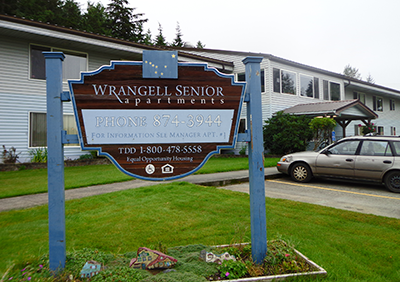Tobacco-Free Alaska > Community Spotlight > November 2016
November 2016 Community Spotlight: Wrangell Senior Apartments Go Smokefree!

Wrangell, Alaska - a borough of approximately 2,369 people located on the northwest corner of Wrangell Island in Southeast Alaska – can now promise healthier living for community elders.
On August 1st, 2016, the board of directors of Wrangell Senior Apartments implemented a comprehensive smokefree housing policy –one that includes electronic nicotine devices – in order to protect a large majority of Wrangell’s senior citizens from exposure to the poisons in secondhand smoke.
According to the 2006 Surgeon General’s Report, there is no safe level of exposure to secondhand smoke. Nonsmokers who are exposed to secondhand smoke at work or home increase their risk of heart disease by 25-30% and risk of lung cancer by 20-30%.
Smokefree multi-unit housing policies are important because they eliminate exposure to secondhand smoke for everyone in the building. Secondhand smoke knows no boundaries. It seeps through light fixtures, electrical outlets, ventilation systems and doorways that are part of shared residential spaces.
Cleaning the air and ventilating buildings cannot completely eliminate secondhand smoke exposure. In fact, these systems may actually distribute secondhand smoke throughout the building.
Smokefree housing is a winning solution for everyone; it improves tenant satisfaction and health, and reduces maintenance and operating costs for owners. It can cost anywhere from $1,800 to $3,500 to clean and turn over a smoke-free apartment, but the cost is significantly higher to rehab an apartment of a smoker. In addition, smoking in multi-unit housing is a fire hazard and poses the risk of injury or death to all tenants, including nonsmokers.
The Wrangell Senior Apartments board members unanimously supported the right to breathe clean air and agreed that creating a smoke-free environment was a priority for health as well as business. Prior to implementation of the policy, the board posted notices for 2 months, giving time for tenants to adjust to the new policy.
Community support was invaluable in the transition. Tammi Meissner, a Southeast Alaska Regional Health Consortium employee and member of the Partnership for a Tobacco-Free Southeast, provided Alaska Tobacco Quit Line cessation materials for those tenants and staff who decided it was time to quit. In the 2 months post-implementation, there have been no complaints from residents of the 24 leased units in regard to becoming smokefree. In fact, one tenant used the August 1st implementation date as her quit date!
Find additional information on smokefree housing and samples of smokefree housing policies at http://dhss.alaska.gov/dph/Chronic/Pages/Tobacco/TobaccoFreeAlaska/housing.aspx.
To find smokefree housing in Alaska, go to www.smokefreehousingak.org.